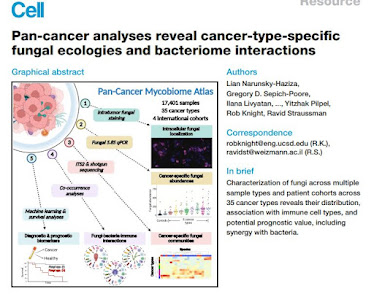The idea that cancer is caused by a fungus, or that it may even be a form of fungus has been proposed by the Italian physician Tullio Simoncini. His ideas have been thoroughly demonized and Simoncini himself has seen his license of practicing medicine revoked.
Now, don't make me intervene in a matter of which I know very little and, for sure, I am not saying that Simoncini is right. I am just noting that, after what we saw happening with the COVID19 story, the demonization of everything which is not "official" in medicine should be taken with a lot of caution.
The thing which I think matters is how complicated things are in everything that has to do with human health. Cancer is normally described as a mutation that makes cells lose their discipline and start reproducing wildly. Things are not so simple as that, I think. The human body has defenses that can rapidly get rid of any rogue cell and it is strange that these defenses become ineffective when dealing with tumors. And, indeed, the story of cancer growth is much more complicated than that.
Simoncini may have had an interesting intuition when he proposed an important role of fungi in human cancers. You can read the story in this recent paper
https://www.cell.com/cell/pdf/S0092-8674(22)01127-8.pdf
which is structured as a headache machine from the first ten lines of text. Nevertheless, I think the point it makes is clear: all the cancer types the authors studied had some fungi associated with them. That is a new piece of information that goes in parallel with the fact that cancers also harbor special bacteria. What is the role of this microbiome? Nobody knows and, correctly, the authors state that "they have not established causation," even though it seems that the presence of fungi is, sometimes, associated with more aggressive cancers.
I think it is possible to say that cancers are holobiont-like assemblies of cells, bacteria, and fungi. If they are, that could explain their resilience and their stubbornness. Holobionts are machines that optimize their own survival, and, in this case, it is unfortunate that the cancer holobiont doesn't seem to care about the survival of its host. Maybe, in the future, we'll learn more about this subject and perhaps we'll find a way to exploit this knowledge to help people who are struck by cancer. For the time being, we can be awed, as usual, at the incredible complexity of life in all its forms.
More discussions on cancer and fungi at
https://www.algora.com/Algora_blog/2022/10/02/7787
https://www.nature.com/articles/d41586-022-03074-z
https://www.healthline.com/health/is-cancer-a-fungus


.jpg)



